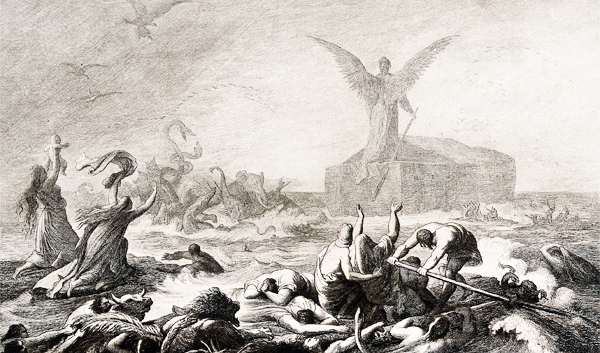
Noah was a righteous man, blameless in his generation. Noah walked with God (Genesis 6:9).
In the midst of the Flood narrative, in which we are told that God saw all the world as corrupt and decided to destroy every breathing creature, we read in contrast that Noah was righteous, blameless, and walked with God. From there, of course, we learn that out of all humanity, only Noah and his family were saved from the Flood.
The obvious question that this passage forces on us is this: what kind of person escapes the judgment of God?
The obvious answer is that only a person like Noah successfully escapes God’s righteous judgment. Yet how was Noah saved? This leads to a second important consideration: which comes first, Noah’s faith or Noah’s obedience? In other words, is Noah saved because he obeys, or does Noah obey because he is saved?
The answer to this question is found in the divine commentary in Hebrews 11:7: “By faith Noah, being warned by God concerning events as yet unseen, in reverent fear constructed an ark for the saving of his household. By this he condemned the world and became an heir of the righteousness that comes by faith.“
Noah trusted in God for his salvation, and thereby became a righteous, obedient servant of God.
Noah’s obedience to God, we are specifically told in Hebrews, flowed out of his faith in God. And Noah becomes righteous by faith. So, just as we would expect from Paul’s clear teaching regarding justification by faith in Romans, Noah did not (and could not) earn salvation by his righteous living. Rather, Noah trusted in God for his salvation, and thereby became a righteous, obedient servant of God.
Noah obeyed God because he was saved by grace through faith.
On the other hand, is obedience necessary for salvation? Absolutely. True faith works. And because true faith works for and obeys the God in whom we are trusting (see the book of James), no person walking in disobedience or rebellion against God is ever given biblical assurance of their salvation.
In fact, the opposite. Paul writes in Ephesians 5:5-6:
You may be sure of this, that everyone who is sexually immoral or impure, or who is covetous (that is, an idolater), has no inheritance in the kingdom of Christ and God. Let no one deceive you with empty words, for because of these things the wrath of God comes upon the sons of disobedience.
As Martin Luther so well expressed, “We are saved by faith alone, but the faith that saves is never alone.” True faith is always accompanied by the righteous marks of true faith.
God’s grace leads to truth faith, and true faith leads to a righteous walk with God.
Although this systematic presentation of theology concerning salvation is not in the Genesis narrative concerning Noah, it is hinted at even there. Before ever mentioning the righteousness of Noah in Genesis 6:9, we first read in the preceding verse that “Noah found favor in the eyes of the Lord” (Genesis 6:8).
It was God’s grace that led to Noah’s faith and thus to Noah’s righteous walk with God.
All this is necessary for accurately understanding Noah’s story, and our own. If we read that Noah was righteous and therefore God saved him from the flood, then we might come away with the misconception that Noah was saved because he obeyed.
However, the full biblical picture concerning Noah is this: Noah was saved by grace through faith, he was therefore declared righteous in God’s sight, and his true faith then issued in obedience to God. And because Noah was an obedient servant of God, God determined — as God determines with every one of his children — to preserve Noah from judgment and to instead bless him beyond what he could ever deserve.
The same thing is true of every true believer in every age. God’s grace leads to truth faith, and true faith leads to a righteous walk with God. It is this kind of person who escapes the righteous judgment of God.